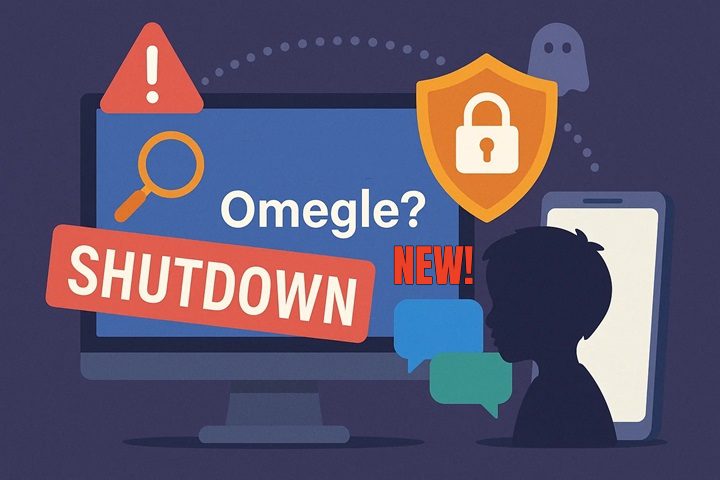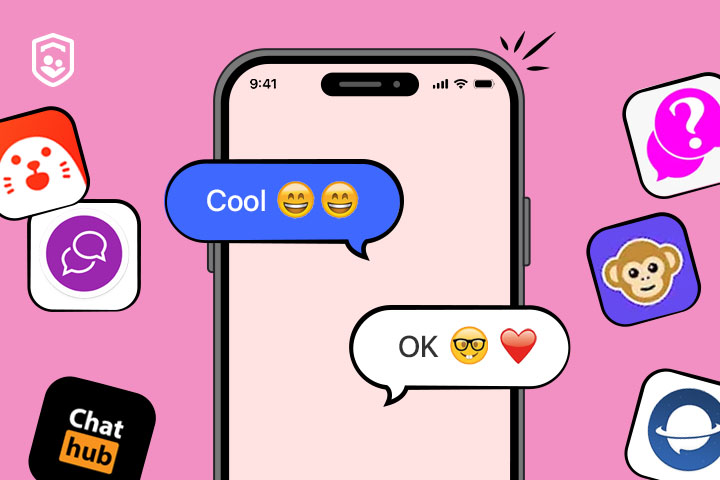Most people around the world use digital platforms to entertain themselves. Especially the young users. They search for exciting new digital spaces. Many teenagers and young adults enjoy engaging in conversations with strangers on anonymous chat platforms. These spaces feel new and interesting to them. However, there are many risks associated with new Omegle platforms. The purpose of this blog is to guide parents. To make parents aware of what is being searched by children on the internet. It discusses the reasons why the Omegle-like websites are popular and the risks behind them.
Why is Omegle banned now?
Omegle was launched on March 25, 2009, by 18-year-old Leif K-Brooks. It was designed to allow users to meet random people worldwide via text or video chat, available for one-to-one or group conversations. The Omegle chat app was free to use and didn’t require signing up. Due to these features and the random global meet concept, this web service became popular worldwide.



However, Omegle shut down permanently in November 2023 due to legal and regulatory scrutiny, losing its battle against misuse and abuse.
The influx of anonymous users has fueled a surge in illegal activities on the platform. They started showing sexual behavior, rape threats, and pornography content; some even targeted minors.
Homeland Security Investigations (HSI) reported a crime incident in 2022 involving Robert Ficzner, a 27-year-old man from Indiana. He got 13 years in federal prison because he shared illegal pictures of a child. Police and federal agencies investigated him after Omegle, where he showed an image of a naked 5-year-old child to other people on the platform. Besides, a report of the BBC News states that the site has been mentioned in more than 50 cases against paedophiles in the last couple of years, in 2023. These became the main reason for the site’s shutdown.
Guide children online before they access. Modern parenting requires the best tool.
What is the new Omegle?
After Omegle shut down in 2023, many websites/apps with a similar concept were launched to fill the void. Since it was popular worldwide for 14 years, users called the newly launched ones “new Omegle.”
There are apps like Chatroulette, ChatRandom, ChatHub, EmeraldChat, OmeTV, and many more. These apps have the same option to have conversations with strangers through text, audio, and video chats. However, these apps launched with safety measures, such as content detection. These apps detect adult content or wrong behavior and ban the account. But these apps are not secure either, as real-time monitoring for so many users is not possible for these apps.
The appeal of anonymous chat platforms
Although they are not completely safe for users, people still use these Omegle-like websites, especially young adults.
- Perceived freedom of anonymity: These chat platforms allow users to remain anonymous. Users express themselves without fear.
- Curiosity: The younger generation seeks out random conversations with strangers as an adventure online and to learn about different cultures and perspectives.
- Peer influence:
10 New Omegle apps parents should be aware of
Many young users search online for new Omegle platforms with features that promise random matching and anonymous interactions. Parents should be aware of these random chats before children come across them. Here are some rising alternatives.



Emerald Chat
Age limit: 18+
Emerald Chat markets itself as an alternative to Omegle, featuring interest matching worldwide and a minimalistic design. It positions itself as prioritizing moderation and safety, yet still allows anonymous interactions.
Key features
- Instant video and text chat that allows strangers to connect in seconds
- It supports 1-on-1 chats (video + text) and also group chats.
- Interest-based matching that
- No strong identity verification
ChatHub
Age limit: 18+
ChatHub has grown rapidly because of its simple and fast connection system. This random video chat site attracts curious youth who want quick social interaction and supports gender and language filters. Age verification is minimal, making it risky for minors.
Key features
- Video chat that starts with one click and connects people instantly
- No registration is required to start chatting.
- Gender filter that creates the idea of control, but does not guarantee real identity
OmeTV
Age limit: 18+
OmeTV is a popular mobile-friendly app offering global video matching. High user volume, but moderation varies by region. The platform promotes speed and convenience. Many young users prefer it because no login requirement.
Key features
- Random video chats and matches for users across the world
- You can choose a country and gender before matching
- No strong personal identity verification.
OmegleMe
Age limit: 18+
OmegleMe’s layout is almost identical to Omegle’s design. That’s why users who miss the original platform turn to this one. Parents should be cautious – many sites with similar names are clones with questionable security.
Key features
- You can connect with other users with just one click
- Meet people with similar interests by tapping on the Interests button and submitting their information.
- On this platform, users can connect with others through text, video, and audio.
- The user can choose the country and meet people from there.
Chatroulette
Age limit: 18+
Chatroulette was launched in 2009 and is one of the earliest random video chat apps. Since then, it has amassed many users worldwide. Still active, but long known for high volumes of explicit content.
Key features
- The user can connect with others by simply clicking one button
- This platform has a worldwide audience that offers unexpected conversations
- Chatroulette does not require a login or registration
- The user can select a country and an interest
Monkey
Age limit: 18+
The Monkey app, a TikTok-influenced app, is popular among teens. Quick video chats with strangers and influencers, but age control is limited.
Key features
- Short-term video chat that pushes fast social decisions
- High volume user matching that keeps users scrolling for long sessions
- You don’t need to share your real name or personal info
- Matching is random, but there is an interest-based matching option
- Monkey gives a 15-second safety timer when you are matched, after which you can choose to continue or move to the next
Chitchat
Age limit: 18+
Chitchat focuses on live video interaction with strangers. A lesser-known random chat app with minimal safety controls or filtering. It uses bright modern design and easy navigation.
Key features
- You can filter who you meet based on interests, region, and gender
- There’s a friend/history feature. You can add interested users and find them again easily
- No need for a real or very detailed profile
Vooz
Age limit: 18+
Vooz calls itself a next-generation anonymous random video & text chat platform. A fast-growing anonymous video chat app with rapid match cycles and limited moderation.
Key features
- Instant matching with the enabled camera
- Interest-based pairing/interest tags
- Weak moderation that fails to remove harmful behavior quickly
Thundr
Age limit: 18+
Thundr advertises AI moderation + spam protection, which might give users a sense of security. But the user reports show a lack of robust identity checks and rely heavily on user behavior.
Key feature
- Instant video chat that begins as soon as the camera turns on
- You can filter matches by interests or location
- You don’t necessarily have to give personal data to start chatting
Other Omegle clones in different domains (warning: fake scam sites)
Hundreds of copycat websites use the “Omegle” name to trick users into sharing personal information or downloading malware. All the clones market with almost the same features and concept – connecting you to strangers via text, audio, or video chat. The concerning part is that these services do not strictly verify users’ ages. Many of them lack well-developed user-reporting mechanisms to address unsafe content.
These common concerns and threats make it important for families to understand how these platforms work.
Risks of emerging new Omegle apps for minors
Children are at extreme danger on such Omegle alternatives. This can put minors at risk, even though these sites and apps often begin with a warning that they are for 18+ users. This is due to the absence of identity checks and safe age-based segregation, and they are still vulnerable to minors.
- Exposure to explicit content: Minors can come across sexual content during video chats. They can also receive bad and inappropriate messages. These situations can give kids emotional trauma and misunderstanding.
- Predatory behaviour: Attackers with bad intentions can steal personal data. Or they can pressure minors into unsafe conversation or actions.
- Cyberbullying: Minors can be insulted or targeted by anonymous users. They can be treated with hate language or humiliated by other users. Such attacks can have severe consequences on self-esteem.
- Psychological pressure and manipulation: Bad users can manipulate minors by promoting risky behaviour or persuading them to keep secrets. This can give minor users long-term psychological damage.
- Personal information leaks: Minors can accidentally share sensitive details during casual conversation. They can reveal school location, phone numbers, or social media accounts. Strangers can misuse these details for stalking or harassment.
- Unwanted recording and content sharing: Strangers can secretly record video chats. They can take screenshots without permission. They can post that content on social platforms.
- Addiction to anonymous interaction: The fast-paced design of chat apps keeps users online for long periods. Constant new interactions can become addictive. Teens may prefer random chat over healthy, real-world relationships.
- Scam exposure: Some Omegle-like platforms include fake links and fake verification pages. Minors can click these pages. These scams can steal personal data. They can push malware to phones and computers.
What parents can do
There are proactive methods that can be adopted by parents to promote online safety. But a safe shield can only work if children follow and listen to their parents. This can happen with open communication. Parents can give awareness, education, and supervision to protect their kids.



Helpful strategies include:
- Talk openly about online experiences and why anonymous chat apps are dangerous. Kids are more likely to listen when the tone is non-judgmental and supportive.
- Teach the importance of privacy and limited personal details sharing.
- Encourage children to refuse and report uncomfortable interactions.
- Set clear rules for acceptable apps, screen time, and online behavior.
- Use privacy filters on devices and browsers.
- Set parental controls on children’s phones and tablets to block high-risk platforms.
- Stay informed on popular teen apps and online trends. Review their app downloads regularly.
- Pick moderated, age-appropriate platforms for socializing online.
- Promote more high-quality offline interactive activities to foster interests, sports, and other pursuits.
Many parents choose the FlashGet Kids safety tool that can monitor their child’s online activities in real time. It will send alerts when risky words and interactions are detected. With app blocking, screen time management, and location tracking features, they support parents without intruding on healthy privacy and serve as modern digital safeguards.
Conclusion
The original Omegle shut down due to rising concerns about user safety. But its shutdown failed to reduce the popularity of anonymous chat sites. Many new Omegle alternatives have emerged, offering the same random chat interactions with strangers and carrying similar risks.
Parents play an important role in digital safety. Awareness matters. Conversations matter. Guidance matters. Children need a safe space to learn about online behaviour. They need support while they explore the digital world. It is a responsibility of platforms to construct better safety systems. Users also have a duty to be cautious. Shared responsibility results in the best outcome.

